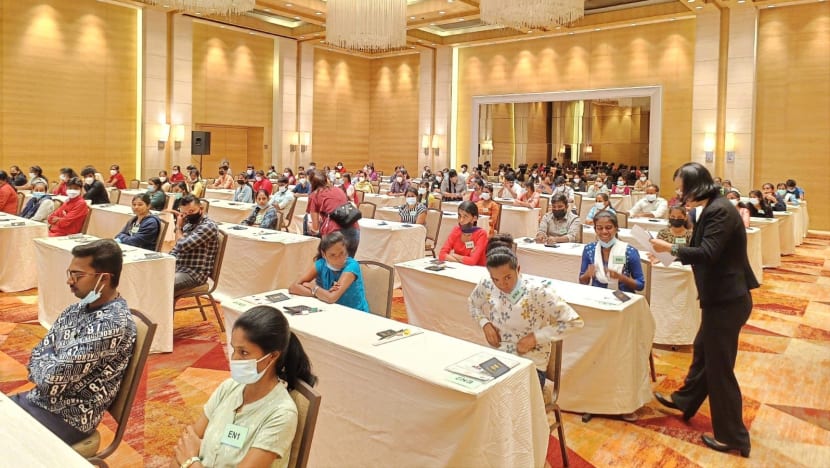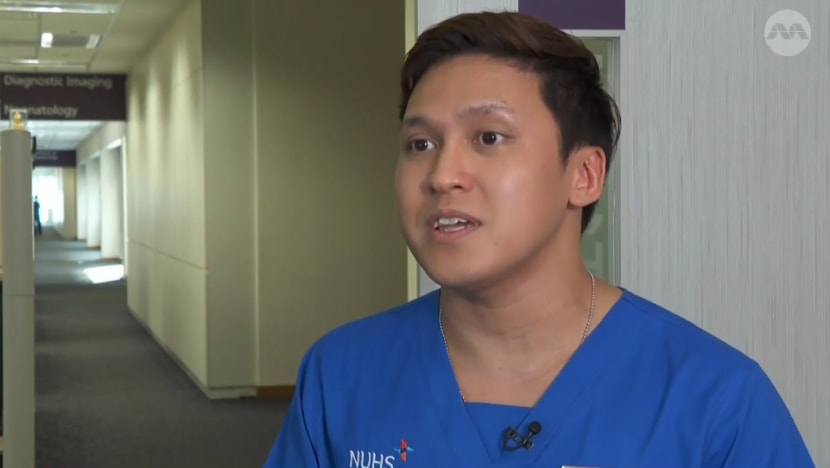Interest from Indian nurses to work in Singapore amid manpower shortage here
This comes as Singapore looks to add about 4,000 new nurses to the workforce by end of the year, with two-thirds of them from overseas.

A recruitment drive for Indian nurses for the National Kidney Foundation. (Photo: Dynamic Health Staff)
SINGAPORE: As Singapore tackles manpower issues in the nursing industry, one bright spot is an increased interest from nurses in India looking to work here.
At least one recruitment agency, Dynamic Health Staff, has seen four times more candidates who are keen to work here in July compared to January. This comes as Singapore looks to add about 4,000 new nurses to the workforce by year-end, with two-thirds of them from overseas.
Among the hopefuls is registered nurse Sana Shahid, who lives in Delhi and has about seven years of experience across departments like the intensive care unit and surgical ward. Remuneration and a good healthcare system are among her reasons for picking Singapore.
“I would love to set up there with my family in the future because Singapore also gives a much better salary in comparison to India,” she told CNA.
Her fellow nurses seeking opportunities in Singapore said that the country’s appeal includes its reputation for being safe. They also said that the advanced medical technology and better quality of life are attractive.
DEMAND FROM SINGAPORE
Dynamic Health Staff director Arun Kumar Ojha said nurses who choose to relocate to Singapore will receive a housing allowance of up to S$500 (US$375) a month, gratuity, and joining bonuses from the institutions they join.
The perks are one of the reasons why it has seen more Indian nurses interested in moving to Singapore recently. This interest is also matched by rising demand from Singapore.
There is “a lot of demand” from the private and public sectors in Singapore, said Mr Ojha, adding that the Ministry of Health Holdings in particular admitted a large number of candidates to the pre-registration process. The process means that nurses are exempted from the Singapore Nursing Board exam.
There is demand from healthcare institutions like National Kidney Foundation and nursing homes, he said.
Foreign nurses must adhere to criteria set by the Singapore Nursing Board and undergo supervised work stints in Singapore before they can be granted local registration.
"We work really closely with a lot of universities and colleges to amend and modify the curriculum to ensure students who are graduating as healthcare workers actually have the requirements that foreign employers want,” said Mr Varun Khosla, chairman at the employment agency.
The agency is set to prepare more than 100 nurses for the next recruitment drive in September.
Of the close to 4,000 new nurses expected to be onboarded this year, there will be a higher proportion of foreign to local nurses – with a ratio of about 60:40. This will make up for the slowdown in foreign nurse recruitment due to the COVID-19 border restrictions, Singapore’s Health Minister Ong Ye Kung said last year.
Even as Singapore ramps up foreign recruitment of nurses, the "large majority" of its nursing workforce will continue to comprise locals from nursing school intakes and mid-career training programmes, Mr Ong added.
RECRUITING LOCAL NURSES
To that end, the Singapore government is also making efforts to increase local nursing manpower amid an increase in attrition rate.
Among them is a S$15,000 sign-on bonus for local nursing graduates.
President of Healthcare Services Employees' Union K Thanaletchimi said that while monetary incentives are welcome, it is not the only factor that will influence decisions.
"We have to review what nurses do exactly – their work hours, their shift patterns, whether there's flexibility at work, (whether) a flexible work arrangement can be the norm in the healthcare sector, and how can we better implement all of this, alongside compensation,” she told CNA.
“It has to be seen holistically, because money itself may not be the answer to all problems.”
After working in the tourism sector for close to a decade, Mr Hendra Roy Osland decided to swap his suits for scrubs to work as a staff nurse at National University Hospital (NUH).
Members of the public can also play a part by appreciating the good work nurses do, she added.
Those looking to make a mid-career switch can also go through a career conversion programme which involves two years of training before deployment to a healthcare institution.
Mr Osland is one of 1,840 people who have gone through a career conversion programme for nursing that was established in 2003.
He was inspired by the healthcare team who took care of his mother – also a nurse – when she was battling cancer. He added that an experience having to resuscitate a guest who collapsed also pushed him towards nursing and he joined the industry full-time last year.
Ms Osland has had to deal with naysayers telling him that nursing is for women and that it is not a professional job, but it has not stopped him.

He added that he also had misconceptions about the industry that almost stopped him from joining, but it was due to a lack of exposure as to what the job involves.
The nursing profession has advanced a lot as compared to decades ago when his late mother was a nurse, he said, adding that people understand the value of the profession better today.
“Nurses are more taken care of. They are more accepted, they are treated better, especially by patients and by patients’ families. So there is a difference there,” he said.
“I wouldn't say that it is all flowery and sweet. But it is really different nowadays. You can feel that you are important. You're making an important difference to the patient's life.”




















